 Harbin Int'l Ice and Snow Festival opens
Harbin Int'l Ice and Snow Festival opens 'Jin' named the word of the year by cross-strait netizens
'Jin' named the word of the year by cross-strait netizens Chinese scientific expedition goes to build new Antarctica station
Chinese scientific expedition goes to build new Antarctica station
 Chinese naval escort fleet conducts replenishment in Indian Ocean
Chinese naval escort fleet conducts replenishment in Indian Ocean 17th joint patrol of Mekong River to start
17th joint patrol of Mekong River to start China's moon rover, lander photograph each other
China's moon rover, lander photograph each other Teaming up against polluters
Teaming up against polluters
CANBERRA, Jan. 7 -- Australian researchers, main stream media and citizens criticized Japanese Prime Minister Shinzo Abe, who was in flagrant disregard of the strong opposition of his Asian neighbors, for his visit last month to Tokyo' Yasukuni Shrine, the memorial which enshrines Japan's war dead including 14 Class-A war criminals of World War II.
"It is clear that PM Abe's visit to the Yasukuni is an insensitive and provocative action, bound to increase tensions with Japan's neighbors," Hugh White, professor of Strategic Studies at the Australian National University, told Xinhua on Monday.
Although some people believe that his visit was driven by domestic political factors, it also had important international causes, according to the professor.
"I think Abe may be using the visit to the Yasukuni to send messages to both Beijing and Washington," he said.
According to him, the visit could be a message of defiance in response to China's declaration of an ADIZ over the East China Sea. And it could be a message of displeasure and disappointment to Washington for what Tokyo sees as America's weak response to the ADIZ, and for Washington's willingness to blame Tokyo as much as Beijing for the escalating dispute.
"In other words, the visit to the Yasukuni might, in part, be Abe's way of saying that Japan is not willing to accept a new strategic order in Asia under which Japan's interests are sacrificed by Washington to avoid problems with Beijing," Hugh white said.
"This is clearly something that worries Japan a great deal, so one can see why that might be a message that Abe wants to send," he added.
After Abe's visiting, as what Prof. Peter Drysdale of the Australian National University said recently, the immediate effect has been to greatly elevate political tensions in Northeast Asia and to raise deep anxieties about his reliability as the leader of the United States' major alliance partner in the Pacific. The U.S. response was low-key but crystal clear. The United States "is disappointed that Japan's leadership has taken an action that will exacerbate tensions with Japan's neighbors."
"On the impact of the visit on the relationship between Japan, China and South Korea, the Abe visit will obviously disappoint China and South Korea greatly and already both countries have expressed their disappointment in no uncertain terms, as has the United States," Peter Drysdale told Xinhua.
One of the main newspapers of Australian, The Australian, also joined the chorus of Abe's critics.
The Australian said in an editorial that Abe has been unnecessarily provocative by visiting the Yasukuni war shrine despite being forewarned that doing so would cause grave offense, particularly to China and South Korea, at an extremely dangerous juncture in the deepening East China crisis.
"The shrine in central Tokyo venerates 2.5 million Japanese war dead, including notorious characters such as wartime leader General Hideki Tojo and other war criminals responsible for the most egregious and inhumane excesses," the editorial reads.
"They were the men who ran the brutal war in China and Southeast Asia in which millions were killed, with Japanese forces routinely massacring, raping and attacking civilians with chemical and biological weapons."
Peter Hall, an Australian citizen, recently wrote an email to Ma Zhaoxu, Chinese ambassador to Australia, expressing his objection to Abe's visit.
"I would like to completely support your government in objecting to this visit by the Japanese Prime Minister, where some of the worst war criminals are buried. Those who died did so to conquer countries in the most brutal way. My understanding is that millions of Chinese were killed and of course the rape of Nanking was disgusting," he said.
He also emphasized that the treatment of Australian's both men and women by the Japanese during World War II was unbelievable in its sadistic treatment.
He said the worst aspect of this is the failure of the Japanese government to acknowledge the cruelty in which the imperial army behaved during the war. "Let us hope that one day they will have the courage to accept the suffering they deliberately unleashed on many countries," he added.
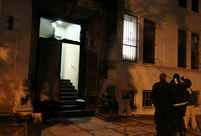 Chinese Consulate General in S.F. burned for arson attack
Chinese Consulate General in S.F. burned for arson attack Roar of J-15 fighter is melody for operator on the Liaoning
Roar of J-15 fighter is melody for operator on the Liaoning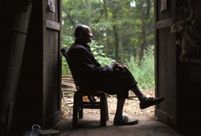 A 90-year-old forester's four decades
A 90-year-old forester's four decades Most touching moments in 2013
Most touching moments in 2013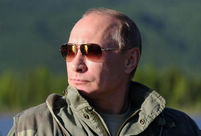 2013: Joys and sorrows of world politicians
2013: Joys and sorrows of world politicians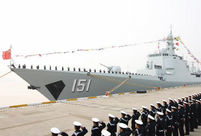 Missile destroyer Zhengzhou commissioned to Chinese navy
Missile destroyer Zhengzhou commissioned to Chinese navy China is technically ready to explore Mars
China is technically ready to explore Mars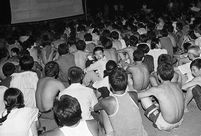 Photo story: Life changed by mobile technology
Photo story: Life changed by mobile technology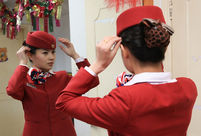 Bullet train attendants' Christmas Eve
Bullet train attendants' Christmas Eve Cradle of high-speed train CRH380A
Cradle of high-speed train CRH380A  'Red Army' division conducts winter training in N China
'Red Army' division conducts winter training in N China  Classic scenes come to life
Classic scenes come to life Harbin Int'l Ice and Snow Festival opens
Harbin Int'l Ice and Snow Festival opens  Cindy attends commercial event with her parents
Cindy attends commercial event with her parents Get to know China's national pole dancing team
Get to know China's national pole dancing teamDay|Week|Month